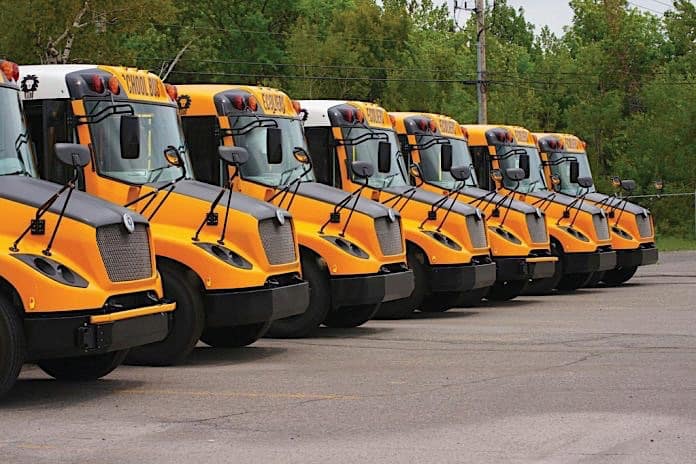A year from now school bus operators will have at least two more alternative-fuel choices at their disposal, and at least one will be on display this month at the NAPT Summit in Kansas City.
While Thomas Built Buses joins Blue Bird and Collins Bus this fall with a propane bus that’s ready for the road, IC Bus announced after Labor Day that its CE Series with a liquid propane injection system will roll out of its Tulsa, Oklahoma plant next summer for the 2015-2016 school year. Potential customers will be able to kick the tires during NAPT’s trade show on Nov. 11.
Additionally, Lion Bus was testing its new plug-in, all-electric bus, aptly named the “eLion,” for a release to also coincide with the start of next school year. A decision on whether this new Type C bus will be in Kansas City had yet to be made by company officials at this report.
FEELING THE ’PANE
The IC Bus CE Series with a propane engine is the result of a partnership with Power Solutions International (PSI) of Wood Dale, Illinois. The 8.8-liter LP propane engine designed specifically for the school bus application by PSI is said to perform much like a diesel engine with high torque and lower engine speeds.
“Until now, the propane vehicle market had been supported by underpowered engines that run at high speeds to get the required power,” said Gary Winemaster, chairman and CEO of PSI. “The PSI 8.8-liter engine is an economic, low-speed solution that boasts diesel-like performance, high durability, reduced noise and overall wear with all the benefits of alternative fuels.”
The engine is rated at 565 pounds per foot at 1,500 RPM with stop-and-start applications to allow rapid acceleration after stops and greater hill-climbing capability. Both IC Bus and PSI said that improving start-ability and grade-ability — while minimizing noise, heat and vibration associated with continuous engine revving — will reduce engine wear, oil usage and the associated maintenance costs.
PSI said propane’s high octane and low carbonand oil-contamination characteristics extend engine life compared to conventional engines. And because it can be converted to gas before it’s combusted, propane may reduce the cold start problems associated with traditional liquid fuels.
“Our customers asked for a better propane fuel choice for the market and we answered,” said John McKinney, president of IC Bus. “Our IC Bus CE Series with PSI’s 8.8-liter LP engine will be the first school bus specifically engineered to run on propane without sacrificing power, performance or durability.”
IC is also partnering with Allison Transmission to offer the new fifth-generation FuelSense package providing fuel economy improvements of 5 to 20 percent.
ELECTRIFIED
On the electric front, Lion Bus and electric drive partners and fellow Quebec-based companies CNTA and TM4 are meeting increased demand, and not just in California. Marc Bedard, president and CEO of Lion Bus, said several urban school districts, especially in the Northeast U.S., where the cost of electricity is among the least expensive in the country, also expressed interest in what he termed “the industry’s lowest-maintenance school bus” during test drive events held last month. He added that several school districts have already pledged to purchase the eLion before the end of this year.
The eLion is a plug-in vehicle that comes in configurations of four to seven lithium-ion battery cells, and perhaps soon an eighth. EnerDel, a provider to the transit and coach industries, develops the batteries. Each cell gets a range of about 10 miles, so the eLion is optimal for short, stop-and-go routes.
Bedard said testing indicates the battery life is about 10 to 12 years, and even after that point, the cells should retain a 70-percent charge. Though reluctant to speculate on the future cost of replacement batteries because of how quickly the technology is evolving, he did point to a University of Delaware study published in May. It concluded that the cost of replacing the battery in nine years “makes little difference in the cost effectiveness of the electric bus” and that research money is better spent on increasing the capacity of the charger. The researchers also found athat the total new purchase cost could be recouped in only 10 to 11 years of service.
Once on the road, the eLion utilizes regenerative braking to sustain the charge. At the same time, Bedard said brake wear and tear is virtually eliminated.
“It almost stops completely without using the brakes at all,” he commented. “I drove it myself and you barely have to touch the brakes. Even the brake lights are going on without touching the pedal.”
Regenerative braking can thus drastically reduce maintenance costs. While Bedard laughed at the prospect of the eLion putting school bus technicians out of business, he did observe that the bus has no engine to work on, no oil to change and no
transmission to service.
“It’s already the lowest cost of ownership, and even with the diesel, we’re on average doing 10 percent better than anyone else right now, even when we’re using (diesel),” he added. “We also see the benefit of the (one-piece composite body) aerodynamics
we’re using.”
While maintenance is simplified, he said there is still safety training that technicians will need when working with the batteries
and electric charge, and training has already commenced for school districts that are purchasing now. Drivers are also being trained, spending a few hours behind the wheel, to learn how the eLion handles compares to a diesel or gasoline model.
“Everything we decided to use with respect to the electric system is quite simple to understand. It’s very simple to maintain as well,” Bedard continued. “But you also need to be careful and you need to know exactly what you’re doing. We are giving all the information needed to the operators to make it avery safe and efficient maintenance and also to the users. So if anything is to happen, you know what to do.”














